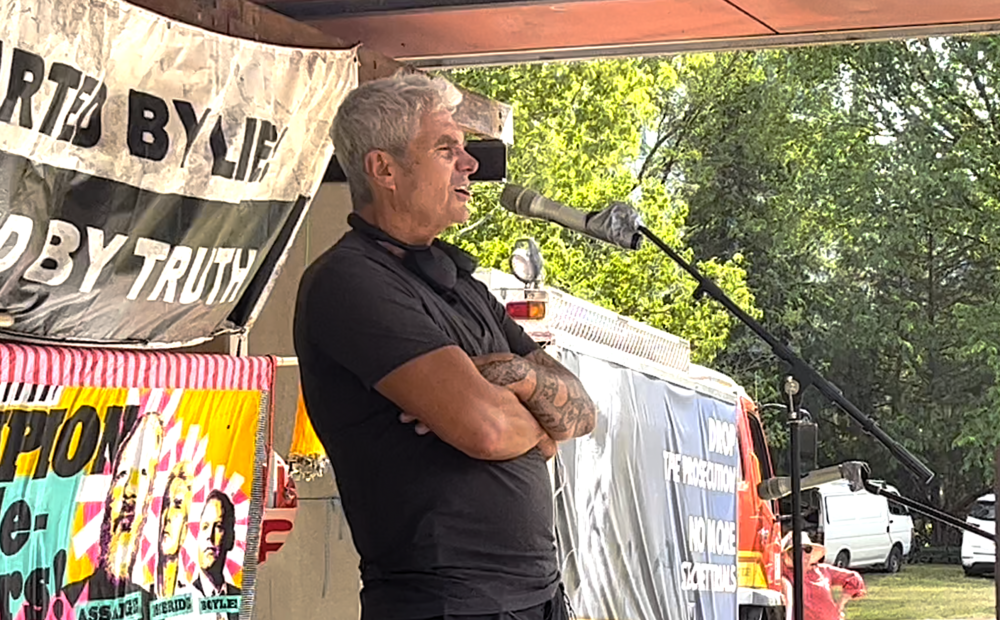The army attorney blew the whistle on Australian military murders in Afghanistan and now faces 10 years in prison. His trial begins Monday in Canberra.

David McBride speaking at a rally in Canberra’s Glebe Park on Sunday, a day before his trial begins. (Joe Lauria)
By Joe Lauria
in Canberra, Australia
Special to Consortium News
The trial of Australian whistleblower David McBride begins Monday in the Australian capital in a case that tests the limits of how far the Australian political and military establishment will go to punish one of its own military men for revealing its war crimes.
McBride was an Australian Defence Force lawyer deployed to Afghanistan in 2011 and 2013. In 2014 he made internal allegations after learning of murders of Afghan civilians by Australian soldiers.
McBride then began leaking evidence to the Australian Broadcasting Corporation, the national broadcaster, between 2014 and 2016.
Australian Major General Justice Paul Brereton began an investigation in May 2016 and made public findings in November 2020 that pointed to “credible information” about Australian war crimes. The Brereton report accused Australian special forces of murdering 39 unarmed Afghans.
Nevertheless, in September 2018 McBride was charged with allegedly stealing government property in violation of the Criminal Code Act 1995. In March 2019 he was charged with three more alleged crimes in breach of the Defence Act 1903 as well as “unlawfully disclosing a government document” contrary, allegedly, to the Crimes Act 1914.
McBride pleaded not guilty to all charges. “Is it really likely that I’m the bad guy and the government is the good guy?,” McBride asked at a rally for him in a Canberra park on Sunday. He said:
“No, it’s pathetic, isn’t it? It’s absolutely pathetic. And you know what my trump card is? That I will go to prison with my head held up high. And even if I have to do ten years, does anybody here doubt that I won’t be able to do that with dignity and strength of character?”
The ABC broadcast a report in 2017 based on evidence supplied by McBride and a second whistleblower. On June 5, 2019 the Australian Federal Police raided the ABC’s Sydney headquarters for eight hours and removed files. The attorney general ultimately decided against prosecuting an ABC journalist, Dan Oakes, who had worked on the Afghan Files story. In March, three years after the Brereton report, the first soldier was charged with murder.
“I actually say the problem is with the generals, not with the corporals and privates,” McBride said at the rally. “You people know that it it’s not going to make this country better if we put a private soldier in jail. … the problem is systemic. The problem lies in every single part of this government.”
In October 2022 the government crushed a bid by McBride to have his case dismissed under Australia’s whistleblower laws.
The trial is expected to last about three weeks at Australia’s Supreme Court. On the first day McBride’s lawyers are expected to argue that he was fulfilling his duty under the Nuremberg principles to disclose evidence of war crimes, a duty that should supersede oaths and national laws to protect secrets.
“It is a serious business being a whistleblower,” McBride said Sunday. “I don’t regret it. I don’t need any sympathy. We’re here for justice. I was made for tomorrow.”
Consortium News is in Canberra and will provide daily coverage, given the international significance of the case as Western governments continue to crackdown on whistleblowers and press freedom to cover up their crimes.
Video by Cathy Vogan for Consortium News.
Joe Lauria is editor-in-chief of Consortium News and a former U.N. correspondent for The Wall Street Journal, Boston Globe, and numerous other newspapers, including The Montreal Gazette, the London Daily Mail and The Star of Johannesburg. He was an investigative reporter for the Sunday Times of London, a financial reporter for Bloomberg News and began his professional work as a 19-year old stringer for The New York Times. He is the author of two books, A Political Odyssey, with Sen. Mike Gravel, foreword by Daniel Ellsberg; and How I Lost By Hillary Clinton, foreword by Julian Assange. He can be reached at joelauria@consortiumnews.com and followed on Twitter @unjoe


David needs to be congratulated for having a go at everything.
Free Assange and McBride .
Prosecute the politicians that brouhgt this to trial.
Striking parallels with Julian Assange an Australian citizen The Australian government is a corrupt, criminal enterprise.
Good luck. I hope you and Julian Assange can take a walk together in the free Australia I used to.know and love.
Whatever happened to it?
Stay safe. Stay free. ?? ?
It is a very good thing for the world, for humanity, that there are people like McBride with us.
It is very unlikely that any of those who have made decisions to prosecute him will ever admit who they are. They are the cowards.
Western governments are putting their fear of the truth getting out about their rogue criminal behavior on full display. They obviously have no clue how terrified they appear before the people of the world.